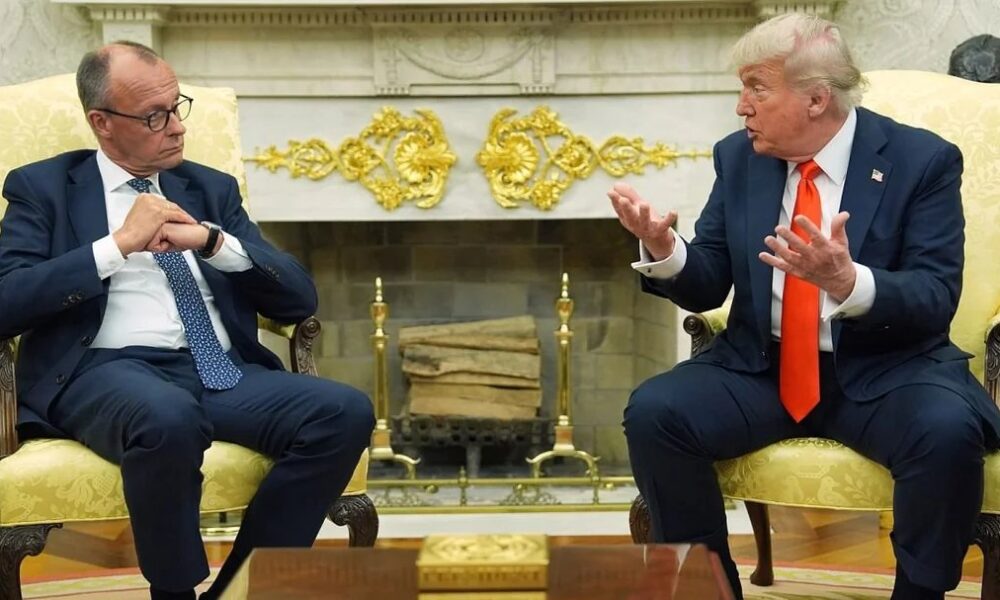Singapore dares to breathe again, but ‘you don’t do this to your friends’
:format(webp)/s3/static.nrc.nl/wp-content/uploads/2025/04/08070458/data130529787-414453.jpg)
On the third floor of a Food Court in the middle of the financial heart of Singapore, five bank employees drink coffee. One of them also works a late breakfast from Noodles. Around their necks hang the passes that offer access to one of the skyscrapers in the Central Business District. Their eyes are aimed at their smartphone on which the last stock market news is visible.
« Yes, there was certainly relief this morning at work, » says one of the young men in the company, « but the uncertainty has remained. »
On Wednesday, Donald Trump announced that he will give a ninety days postponement for the towering rates that he previously announced for a number of Southeast Asian countries. So there is room to negotiate, but a generic 10 percent goes directly.
None of the five bank employees want to give his name: they do not have permission from their employer, one of the major international banks in Singapore, to talk to the press. “It has been an incredibly volatile situation. And now we can’t help but Wait and See« , Says one of the female bank employees. She tells how she has been detecting her own individual spending pattern since the announcement of the higher import rates: » I am less luxurious now, and I reconsider a holiday to the US. »
The Food Court is located next to Raffles Place, the central square in the financial heart of Singapore. Here are the large Asian financial institutions such as UOB, HSBC and Bank of Singapore, but also JP Tomorrow, BNP PARIPAS and Deutsche Bank keep an office there. A robot cleans the street for the headquarters of the Chinese bank OCBC. In the lobby where employees are waiting for the fast lifts to bring them to the 49th floor, Channel News Asia is on, a television channel based in Singapore, aimed at Asian (Business) News. The postponement of import tariffs is Breaking News. Just like the news that China, after it took countermeasures and increased import duties for the US, is punished by Trump by levying a rate of 125 percent immediately.
Breathing
A little further on, the Singaporean stock exchange is located on Shenton Way. The trade nowadays takes place digitally, not a spectacle of busy traders. But the mood is great: the Straits Times Index opened, following the euphoria at the American fairs and, like other Asian stock market reasons, good in the plus (8.2 percent), and also during the morning the prices remain green.
« We are indeed seeing a correction, » says Geoff Howie, market strategist at SGX Group, the company behind the stock exchange in Singapore. « But we are not quite there yet, although the mood is more positive. » It was mainly the shares of banks and financial institutions that got the blows on the Singaporean fair, says Howie. They are the most touched since many of them do business in the region, and the import tariffs for Asian countries are very strong.
The American delay gives some breathing space: for countries to negotiate with the US, for companies to think about their strategy and for trade fairs, they can recover. But connoisseurs warn: « If the rules change almost daily, then that is not a healthy basis for doing business. And so the uncertainty remains. » Howie sees that too. His expectation is that the figures on consumer and investor confidence, as well as employment figures, will show a decrease as a result of all the developments of recent times. Investors and companies only make the place. Prime Minister Lawrence Wong warned earlier this week.
The bank employees think it is ‘very good’ and ‘unusual’ that Wong expressed himself so clearly in parliament on Wednesday. There he called the established import rates « disappointing » and condemned the US actions. « You don’t do this to your friends », referring to the years of bond between Singapore and the US and the free trade agreement between the two countries « The era of globalization based on rules and free trade is over. We are entering a new phase of international relations. One that much random, more protectionist and more dangerous Is, « said Wong.
Pause button
Because even with a rate of ‘only’ 10 percent, the economic growth of Singapore will be « significantly », warned Wong, which is also Minister of Finance. Singapore leans heavily, for, among other things, food, on import. The growth of between 1 and 3 percent predicted for this year will most likely have to be adjusted down, the prime minister said. Nevertheless, Singapore did not decide to come up with countermeasures. « Because it will have a direct effect on the Singaporese. »
By pushing the pause button, Trump now says he rewards the countries that have not come with countermeasures. Including most Asian countries: for them for the time being ‘only’ the ‘basic rate’ of 10 percent will apply versus the rates will rise to 49 percent that some countries were imposed.
Experts were already very skeptical or countries such as Vietnam and Cambodia, where the exporting textile sector is essential for the economy, could take care of the considerably high rates themselves. « That is unlikely, » said Albert Park, chief economist at ADB in Manila, on Wednesday to Channel News Asia. « These countries will first have to be able to prove that they do their best to buy more American things, and then hope that there will be an adjustment of the rates. »
Moreover, mutual trade in the region cannot take care of the blow in its entirety, the chief economist thinks. « Other markets can be searched for, but that is a challenge, since many countries will be hit by this negative economic shock. »
Read also
Trumps taxes float Southeast Asian countries into the arms of China
Just relax
Kris Ang thinks that despite the measures that the government takes to compensate for the import tax of 10 percent, ordinary life in Singapore is becoming more expensive. Ang works as a ship broker for cargo ships at OSM Thome: she ‘brings’ bulk products such as wood, sand, cabbage, at the man at the right transport company. The import tariffs have been keeping her and her colleagues busy for days – the cargo companies in particular will feel the higher rates, says Ang. Especially the Chinese: « 80 percent of all ships here are Chinese. »
This Wednesday evening at the door of the Singapore Chinese Culture Center, Ang gathered with around thirty others. In rows of four they are set up for the teacher on stage. In alternating Chinese and (broken) English, he explains the Taichi movements and performs, the group tries as good and evil as possible to imitate him. With one it is a bit smoother than with the other. Angs office is around the corner and this weekly lesson is a nice moment to relax. « Just a moment for meditation. »
Despite the uncertainty, she is optimistic. « Singapore survives this, » says Ang. « Yes, prices were already rising, and with this import rate of 10 percent they will rise sharper, but we can take care of this. »

:format(webp)/s3/static.nrc.nl/images/gn4/stripped/data133280221-bb4cba.jpg)
:format(webp)/s3/static.nrc.nl/images/gn4/stripped/data133212425-ae69bf.jpg)
:format(webp)/s3/static.nrc.nl/bvhw/files/2019/08/web-1708zatwongjpg.jpg)


